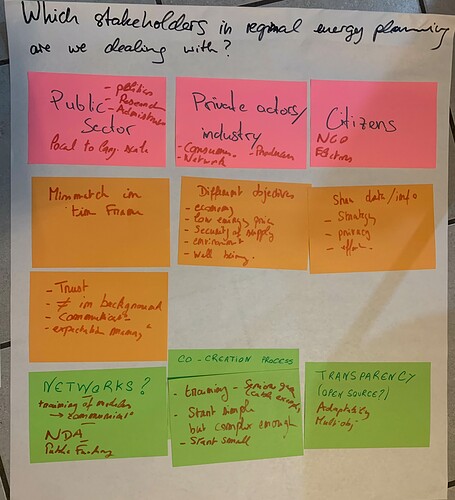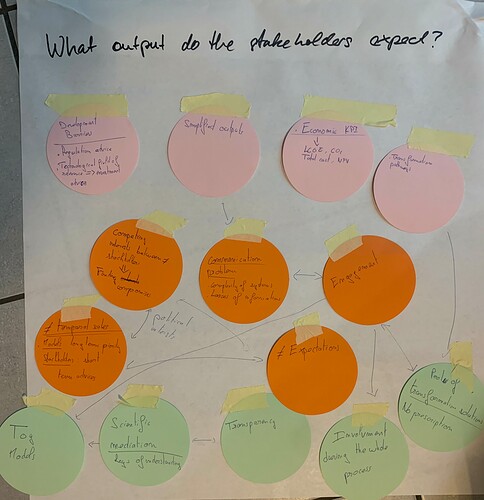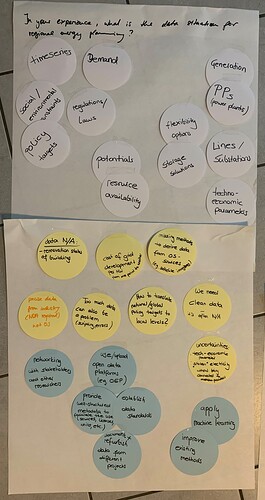- genre: break‑out‑group
- title: Addressing different Stakeholders: How do we use energy system modeling and optimization in tools to support regional energy planning?
- presenter: @MaGering
- description: The purpose of this break-out group is to share experiences and best practices on using energy system modeling and optimization to address different stakeholders.
- background: In the break-out group we will cluster different stakeholders and evaluate what level of detail they expect from regional energy planning tools. We also share information on energy system optimization, such as calculating transformation paths or target years.
In the workshop at Openmod in Grenoble today, we had a stimulating and insightful discussion in the format: World Café.
We dealt with three topics:
- What stakeholders are we dealing with in regional energy planning?
- what are we modeling for them and
- what is the data situation?
We found out that we are dealing with stakeholders from the public and private sectors, but also with citizens.
We often encounter problems such as trust issues, a mismatch between the legislative period of the decision-makers and the required projections horizonts, different perspectives that are difficult or impossible to model, and data that is not open or available.
As best practices, we have identified strengthening the network, introducing communication training and increasing transparency (open data).
We also found that what stakeholders often ask for are transformation paths, scenario calculations and various KPIs. Regulatory inputs and decision-making issues are also frequently requested.
Here, too, there are communication problems, different political interests and a discrepancy between the expectations of the tools in terms of user-friendliness and clarity.
As best practices, we have identified offering several solution options or pointing out inadvisable solutions, involving stakeholders during the entire project duration/tool development time and offering toy models.
In terms of data, we have found that we need the same data that we normally need to optimize an energy system. Further data we need are i.e. regulatory and legal data, socio-demographic and economic data and environmental data.
Problems arise in terms of data availability, for example a lack of data on the renovation status of buildings, industry data and grid expansion costs per MW. However, too much data can also become a problem as soon as the data has to be preprocessed before it can be used. There is also a lack of methods for obtaining data (e.g. from OS services such as satellite data).
We have found the following best practices: Calculate data with low uncertainties more roughly and instead focus on more detailed calculations of the data that is subject to high uncertainty. Other possible solutions include uploading collected data to open data platforms and using the data available there, providing good metadata and establishing data standards. It can also be helpful to strengthen networking with stakeholders and other scientists, use machine learning to determine data and process data from older projects or models.
Many thanks to all participants for being there and for your inspiring input! ![]()
Thanks for the very interesting workshop. I think it would be interesting try to create a wiki on this discussion. Is it possible to work on that through this openmod web site ? I’m not used to it but if one show me the first step I’m willing to contribute !
Robin
Hello @RobinGirard : this posting is now a “wiki-post” that anyone registered on the forum can now edit. To create (or uncreate) such a posting, navigate to the bottom-right and then: … > ![]() > Make Wiki
> Make Wiki
(Feel free to delete my instruction.)


